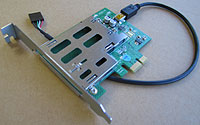 This is intended to address questions regarding PCIe to ExpressCard readers. The PCI Express (PCIe) specification allows for hot-swapping of PCIe devices. Since ExpressCard is simply PCIe and USB with different connectors, it would follow that PCIe to ExpressCard adapters should inherit such behavior when installed in computers with PCIe slots. Unfortunately this isn't always the case. A system's BIOS (or firmware) and the host operating system need to treat an PCIe slot as having hot-swap capability. This behavior is taken for granted on notebook computers. When PCIe to ExpressCard drives were released, manufacturers assumed host systems would treat them the same.
This is intended to address questions regarding PCIe to ExpressCard readers. The PCI Express (PCIe) specification allows for hot-swapping of PCIe devices. Since ExpressCard is simply PCIe and USB with different connectors, it would follow that PCIe to ExpressCard adapters should inherit such behavior when installed in computers with PCIe slots. Unfortunately this isn't always the case. A system's BIOS (or firmware) and the host operating system need to treat an PCIe slot as having hot-swap capability. This behavior is taken for granted on notebook computers. When PCIe to ExpressCard drives were released, manufacturers assumed host systems would treat them the same.
 Most desktop machines are not setup to hot swap on their PCIe slots. At first operating system vendors blamed BIOS makers for the problem, but recent developments seem to indicate it is not only the BIOS makers to blame. Synchrotech learned this with a desktop machine with a PCIe to ExpressCard drive (EXP54-CR-PCEIR1) installed. When the drive wouldn't hot-swap under The Windows XP, Synchrotech was told the BIOS was to blame. However, with the release of OpenBSD 4.3, our tests showed the PCIe to ExpressCard drive could hot-swap PCIe based ExpressCards without any modifications to the system's BIOS. Our conclusion is it is a combination of both the BIOS and operating system. Synchrotech is working hard to get operating system and BIOS vendors to rectify this problem. Currrently, many systems require booting with a PCIe based ExpressCard in the ExpressCard slot in order to have the card recognized.
Most desktop machines are not setup to hot swap on their PCIe slots. At first operating system vendors blamed BIOS makers for the problem, but recent developments seem to indicate it is not only the BIOS makers to blame. Synchrotech learned this with a desktop machine with a PCIe to ExpressCard drive (EXP54-CR-PCEIR1) installed. When the drive wouldn't hot-swap under The Windows XP, Synchrotech was told the BIOS was to blame. However, with the release of OpenBSD 4.3, our tests showed the PCIe to ExpressCard drive could hot-swap PCIe based ExpressCards without any modifications to the system's BIOS. Our conclusion is it is a combination of both the BIOS and operating system. Synchrotech is working hard to get operating system and BIOS vendors to rectify this problem. Currrently, many systems require booting with a PCIe based ExpressCard in the ExpressCard slot in order to have the card recognized.
Synchrotech, a Division of Synchronized Technologies, Inc. 7536 Tyrone Ave. Van Nuys, CA 91405
All specifications and prices subject to change without notice. All trademarks and trade names referenced are properties of their respective owners.
Copyright 2021 Synchrotech, all rights reserved. Privacy policy | Terms of use